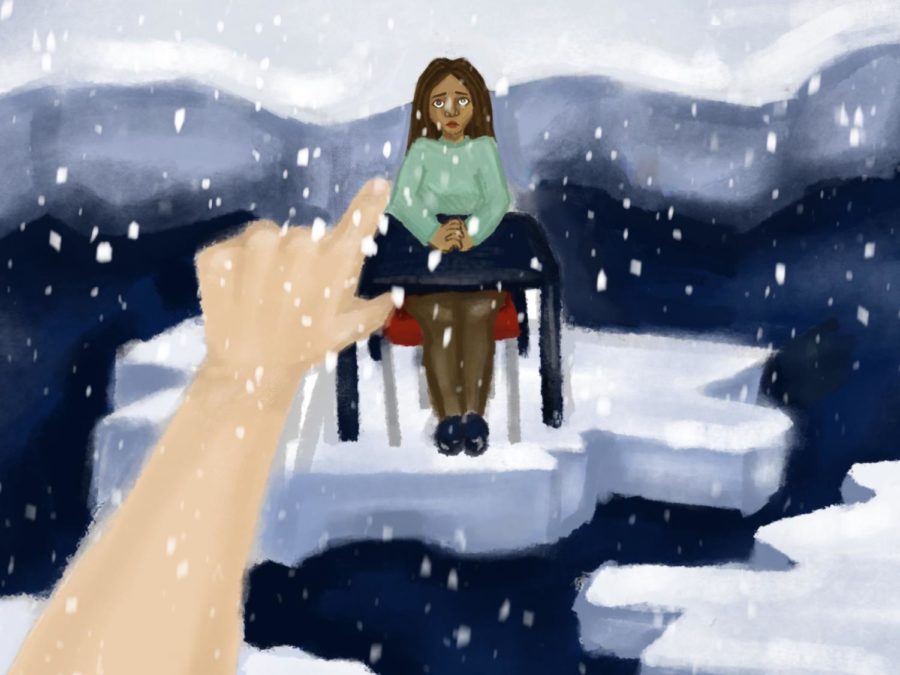Menlo Community Reflects on Cold Calling
Some Menlo teachers strongly believe in cold calling while some never cold call. Staff illustration: Tatum Herrin.
February 6, 2022
Calling on a student to answer a question when the student doesn’t raise their hand, also known as cold calling, is a controversial topic among Menlo teachers and students. To some, cold calling incentivizes engagement during class and gives introverted students an opportunity to share their perspectives. To others, cold calling is anxiety-inducing, embarrassing and does not belong in a classroom.
Math teacher Randy Joss is a strong believer in cold calling and aims to call on each of his students a few times per class, whether they raise their hand or not. He views cold calling as a scale, from high stress to low-stress cold calling. High-stress cold calling asks for an answer and low-stress cold calling asks for the first step in the process. Joss prefers to use low-stress cold calling. “I don’t want the answer. What I’d like to know is if you were going to try and figure [a problem] out, what would your first step be?” Joss said.
Joss believes that cold calling challenges a student’s capabilities better than a worksheet can. “I want to get every student to the point where they’re constructing their own understanding and that takes some energy on their part,” Joss said.
English teacher Oscar King has similar views to Joss and emphasizes a need for a variety of opinions. “The goal of the classroom is to be exposed to a diverse set of voices. Different people have different ideas,” King said. “I [cold call] to give people an opportunity to hear voices that aren’t necessarily the extroverts with the really aggressive hand up.”
Science teacher Tanya Buxton agrees that hearing a variety of opinions in class is important, yet believes that it can be accomplished in other ways. She tells students beforehand during group activities that they will be called on. “They still might not know the answer, but at least they know they’re about to be called on and have a little time to prepare something to say,” Buxton said.
Some people believe that cold calling is harmful to introverts. Freshman Leo Terman doesn’t think that teachers should ever cold call their students. “I think [cold calling] really demoralizes a classroom. If students don’t feel like they want to raise their hand then they shouldn’t have to,” Terman said. “Teachers don’t know what students are going through, and it’s not nice to call people out when they’re literally just trying to exist in a classroom.”
Freshman Jaya Vazirani agrees that cold calling causes stress. “I prefer to participate on my own,” Vazirani said.
Not all students are against cold calling. “I think it has its benefits because it sort of keeps people paying attention and makes sure you [are] actually following along and staying in tune with the class,” senior Sam Scola said.
Many agree that cold calling can be anxiety-inducing. However, the controversy arises in terms of stress being beneficial or harmful to classroom environments.
“Absolutely, [getting cold-called on is stressful], I think it should be,” King said. “It’s a useful skill to be able to share your voice proudly and compellingly and speak your truth.” He also believes that it’s useful to participate in a classroom setting. “If not here in a safe space where we have control, then where?” he said. Joss agrees that a classroom is a low-stakes environment where it’s acceptable to make mistakes.
“I think it’s important to lean into the discomfort to get a better understanding of the [class content],” sophomore Arthi Abhyanker said.
On the contrary, some teachers do as much as possible to avoid a stressful classroom environment. “I don’t like anxiety to be a part of the classroom experience at all,” English teacher Rebecca Gertmenian said.
Buxton doesn’t like her students to feel caught off guard and feels as though cold calling initiates discomfort. “[Cold calling] may turn off some of the introverts and may make them shut down more,” Buxton said.
Science and math teacher Elizabeth Young acknowledges that cold calling can make students more attentive. However, she chooses not to. “To me, unless you set up the classroom environment and expectations first, the anxiety of cold calling would outweigh the alertness gain,” Young said.
Many teachers have begun to cold call during online learning to encourage participation. “I think there’s some [difficulty] on Zoom with people unmuting because they can’t really see each other in the same way as if someone’s raising their hand,” Young said.
Instead of directly calling on students unannounced, Young checks to see if a student’s answer is correct through the chat feature and asks them to explain their process to the class. “It helps them focus on the problem instead of the anxiety of being called on,” Young said.
Gertmenian also started to cold call during the pandemic, picking students’ names out of a jar and calling on that student. “Students actually reported that they liked it because they didn’t know when they were going to be called on, so it helped them from getting distracted,” Gertmenian said. She occasionally uses this method at in-person school, yet prefers to let students raise their hand. “Cold calling can make students really anxious and feel like they’re going to be put on the spot or exposed for not being able to engage with a question,” Gertmenian said.



